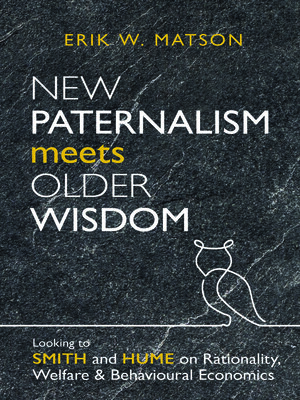New Paternalism Meets Older Wisdom
ebook ∣ Looking to Smith and Hume on Rationality, Welfare and Behavioural Economics: Looking to Smith and Hume on Rationality, Welfare and Behavioural Economics
By Erik W. Matson

Sign up to save your library
With an OverDrive account, you can save your favorite libraries for at-a-glance information about availability. Find out more about OverDrive accounts.
Find this title in Libby, the library reading app by OverDrive.



Search for a digital library with this title
Title found at these libraries:
| Library Name | Distance |
|---|---|
| Loading... |
What can today's behavioural economists learn from the classical liberals of the past? Here, Erik Matson offers critical reflections on what he calls 'the new paternalism' – a modern-day approach to policy-making that aims to make individuals better off, when judged by their own standards. He argues that the new paternalist approach to policy is far too prescriptive, relying on inappropriate conceptions of rationality and welfare. And he looks to the works of two giants of economics and philosophy – Adam Smith and David Hume – for a richer vision. He places Smith and Hume's 18th-century writings into a contemporary context – and concludes that today's practitioners could learn much from their wisdom. This wisdom, he contends, acknowledges the deep complexities of rationality and welfare. It shows why policymakers should focus on securing citizens the freedom to cultivate their interests, and why regulators should employ the power of persuasion – rather than paternalism – to help individuals help themselves.|What can today's behavioural economists learn from the classical liberals of the past? Here, Erik Matson offers critical reflections on what he calls 'the new paternalism' – a modern-day approach to policy-making that aims to make individuals better off, when judged by their own standards. He argues that the new paternalist approach to policy is far too prescriptive, relying on inappropriate conceptions of rationality and welfare. And he looks to the works of two giants of economics and philosophy – Adam Smith and David Hume – for a richer vision. He places Smith and Hume's 18th-century writings into a contemporary context – and concludes that today's practitioners could learn much from their wisdom. This wisdom, he contends, acknowledges the deep complexities of rationality and welfare. It shows why policymakers should focus on securing citizens the freedom to cultivate their interests, and why regulators should employ the power of persuasion – rather than paternalism – to help individuals help themselves.







